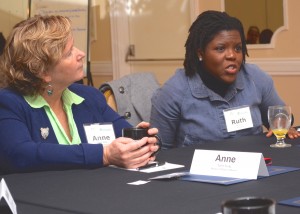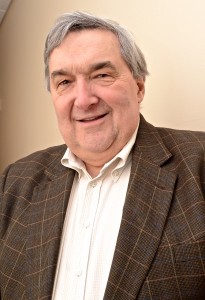
Fred Galloway doesn’t mince words when it comes to governance. Non-profits that do it well succeed; those that don’t should brace themselves for a one heck of a slide.
“The energy and resources to turn a downward graph around are enormous,” he said March 6 as the latest Manulife Board Goverance Boot Camp wrapped up.
Galloway’s management consultancy, F.J. Galloway & Associates, works with non-profits. He regularly contributes his expertise to the governance boot camps run by Capacity Canada and supported by Manulife.
Board chairs and senior managers in the charitable not-for-profit sector typically make up the roster.
The March 6 event featured a surprise: members of the class were the first to learn about a new award established by Capacity under its partnership with Manulife. The award carries a $5,000 prize and honours an agency that has shown an outstanding commitment to smart governance.
Details will be worked out through the summer. The winner will be announced at the opening of the 2015-16 boot camp Nov. 19.
Meanwhile, Galloway gave the 2014-15 participants plenty to think about.

Governments are setting higher accountability standards. Funders want to clearly see how their donations make a difference.
And some organizations in this climate of change will have to ask hard questions about their own relevancy — whether they should close, or merge with other agencies.
All the more reason, Galloway said, for organizations to carefully recruit for their boards and clearly state what it means to be a director.
“The accountability dimension has grown by leaps and bounds,” Galloway said. “Attracting talent (to boards) will be a challenge.”
Boot camp members came away from break-out sessions with a long list of challenges they face: board turnover, amalgamations, bylaw changes and the need to do more work setting boundaries between what boards and administrations do.
Galloway had some suggestions:
• Give potential board recruits a one-page document that spells out the workload;
• Create an orientation binder for new board members;
• Pair-off new board recruits with experienced members for mentoring;
• Make sure everybody understands the limits of the directors-and-officers liability insurance carried by the organization. Have the insurance agent update the board once a year.
• Reach out to other cultural groups for recruits, and do it soon. Government funders are taking a closer look at board composition before writing cheques.
Capacity has been holding annual governance boot camps since 2009. The next one runs Nov. 19-21 in St. Jacobs, with a follow-up session in March 2016.
The program helps new organizations frame the development work they want to do, said participant Ruth Cameron, executive director of ACCKWA (AIDS Committee of Cambridge, Kitchener, Waterloo and Area). For established organizations, it serves as a checkpoint for how well they are keeping to their best practices.
“You know what they are, you know what needs to be done,” Cameron said in an interview. “Are you doing all of those things, and where are your opportunities for innovation? I think Capacity Canada has given us a great tool for doing that kind of work.”

